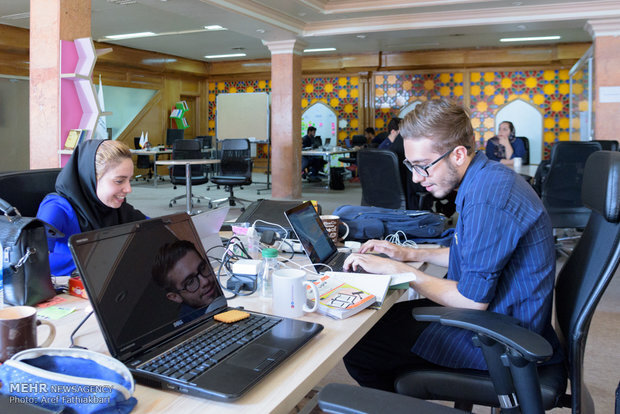Startups come to light with No-Afarin scheme

TEHRAN -- The No-Afarin scheme, developed by the Information and Communication Technology Ministry to support startups, was introduced during a ceremony on Wednesday.
As the nature of startup as an emerging company founded by entrepreneurs to develop a product or service suggests, its future is unclear and this issue makes it different from companies and organizations.
The scheme aims to deal with the problems startup ecosystem facing in relation with insurance companies and the National Tax Administration.
With the slogan, ‘Smart Iran, brighter future’, the scheme is a part of the digital economy development document and aims to create 68,000 job opportunities.
ICT Minister Mohammad Javad Azari Jahromi said that with the registration of 100,000 active startups in the scheme, Iran can join five unicorns - privately held startup company valued at over $1 billion - until the end of the sixth five-year national development plan (2021).
He called the No-Afarin scheme the first step to transform the Information Technology Organization of Iran into a digital economy development organization in the near future.
But how the scheme can be considered as a step toward a brighter future? What is the digital economy and how much Iran has provided infrastructure to reach this goal?
First of all, it is better to know about the details of the No-Afarin scheme, which can be known as a practical step taken by the government to strengthen the innovation ecosystem in Iran.
The scheme in detail
In a recent interview with the Digiato website, the secretary of the Association of Online Business, Reza Olfat-Nasab, announced that about 90 percent of online businesses in Iran are loss-making firms according to the assessment of the National Tax Administration.
However, this is the nature of this kind of business that they should continue in order to reach profit after some years, he explained.
The scheme tries to cover such gaps between startups and state-run organizations.
Based on the nature of a startup, it is a young company founded by one or more entrepreneurs in order to develop a unique product or service and bring it to market.
The scheme provides facilities for startups that were registered less than three years ago with making an investment of maximum 2.5 trillion rials (about $58,000) and having less than 50 trillion rials (about $120,000) of income.
It facilitates the insurance and tax laws for the startups and paves the way for attracting investors. The startups are completely tax-exempted as far as they provide services and products.
The startups can employ trainees for two years while according to the law, the companies can benefit from trainees between four to six months. According to the scheme, startup owners should not distribute profit, while they should add it to investment.
The government provides insurance coverage for the trainees and the startups have not to pay any money.
According to the scheme, coworking spaces and accelerators are recognized as the official places that can receive insurance code.
The factors are assessed in the e-government process and there is no need for filling the forms in person.
Previously, the government provided financial facilities for startups, however, the best way for investment in startups is through venture capitals (VCs).
The government established Fund of Funds (FOF) that gives loans to VCs, however, they should invest the money in a startup and are not allowed to loan the money to startups.
The scheme also provides an opportunity for foreign companies to establish accelerator centers in Iran, which was not allowed so far.
According to previous laws, the license of a startup was not transferred to a big company that bought it. According to the No-Afarin scheme, the license of a startup is transferred to the company that buys over 67 percent of the startup share.
All the information and processes are available on the website irannoafarin.ir that is developed by the Information Technology Organization of Iran (ITO).
The Iranian ICT Guild Organization manages the website in order to reduce the role of the government in managing the innovation ecosystem, the ITO director Amir Nazemi said.
So far, 129 startups, 191 startup teams, 23 companies, 16 accelerators, and incubator centers and seven investors have registered on the website.
Long way to go, but steps were taken
According to techopedia.com, the digital economy is a term for all of those economic processes, transactions, interactions, and activities that are based on digital technologies and many digital tools including the internet.
Iran has had several achievements in different fields of the digital economy in recent years. According to statistics released by the ICT Ministry in September 2018, over 93,700 job opportunities were created in the field of the smart transportation system, e-commerce and mobile applications in Iran during the Iranian calendar year 1396 (March 2017-March 2018).
One cannot undermine the role of startups, as emerging institutions with innovative solutions, in the development of the digital economy. Most startups provide online services and product, which strengthen the digital economy in the country.
On the other side, e-government and transparency are other important elements, which can boost the digital economy and ecosystem.
The ICT Ministry announced that the goal of e-government has been realized by 62.8 percent in the country before the first Iranian month of Farvardin, which began on March 21. However, a long way is to go to implement e-government in different organizations and companies.
Startups can pave the way for a brighter future. Their motivation, energies, and solutions can lead to a better society to live in. The good news is that the government recognizes its crucial role. There is a long way to go, but steps are being taken.
SB/MG
Leave a Comment